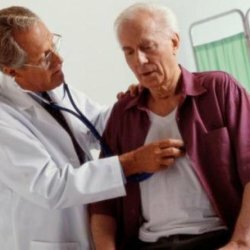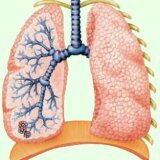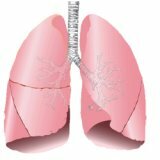Pneumonia attacks the elderly
 Pneumonia is an acute disease caused by an infection. It is characterized by inflammation of the lung tissue, damage to the alveoli and interstitial lung tissue.
Pneumonia is an acute disease caused by an infection. It is characterized by inflammation of the lung tissue, damage to the alveoli and interstitial lung tissue.
Weakened lungs are most often affected by weakened people. That is why this disease is one of the most common among the elderly in all countries of the world.
Manifestation of pneumonia
The peculiarity of pneumonia in elderly people is the possible absence of characteristic signs of the initial stage of this disease, such as temperature, cough, and chest pain. At the beginning of the disease, the elderly become weak, sluggish, they lose their mood and appetite. In some cases, pneumonia in the elderly begins with an excited state and delirium.
Clinical manifestations of pneumonia include pulmonary and extrapulmonary symptoms.
Pulmonary symptoms of
One of the most basic pulmonary manifestations in old people is shortness of breath, heaviness and chest pains that result from the inflammatory process in the lungs. A classic sign can be considered weak crepitus or its absence. This is because the compaction of pulmonary tissue with pneumonia in the elderly is not always enough to form crepitations.
Due to the presence of background pathologies, such as heart failure, chronic lung diseases, it is more difficult to detect pneumonia in the elderly than in young people. That's why the elderly people undergo hyperdiagnosis of pneumonia.
Extrapulmonary symptoms
Pneumonia in people of old age may be accompanied by fever, but even more often the initial stage of the disease is characterized by normal or decreased body temperature, which is considered a less favorable symptom. Manifestations of pneumonia in the elderly are apathy, drowsiness, confusion, complete refusal of food, incontinence.
In addition, carefully looking at the patient, you can see the blue tint of the lips, nose, fingertips.
Pneumonia in elderly patients with background diseases can manifest themselves in different ways. So, for example, in people with chronic lung diseases pneumonia is accompanied by a strong cough, respiratory failure. Such symptoms can be mistaken for physicians as signs of chronic bronchitis.
Treatment of pneumonia in elderly people
Having noticed similar symptoms in an elderly person, treat it at home and without a doctor's supervision is contraindicated. Antibiotics and sulfonamide preparations without a doctor's recommendation can not be given to a patient. This can lead to serious consequences.
Despite the fact that it is difficult to establish the development of pneumonia in the elderly, it is impossible to delay with treatment. It should be started immediately after diagnosis.
In practice, patients over 60 years of age can be treated on an outpatient basis. But the immediate hospitalization is subject to elderly people with severe inflammation, the symptoms of which are prolonged dyspnea and cyanosis, severe fever, arterial hypotension and tachycardia. In addition, the need for hospitalization of the patient indicates: the presence of chronic diseases, lack of improvement after 3-day therapy, anemia, kidney failure.
Out-patient treatment requires special care and complex therapy. Important components of complex treatment are improvement of metabolic processes in the patient's body, strengthening of the body's protective capabilities.
It is necessary to follow the requirements of personal and general hygiene of the elderly person, regularly ventilate the room in which it is located. The patient should be fed in small portions and often. Food should be easily digested, useful, high-calorie, sparing chemically and mechanically. Do not forget about the liquid. It can be tea, cooked on herbs, rose hips infusion, orange juice, diluted with water or cranberry mors. All drinks should be warm, as warm drink dilutes sputum, but not hot. It is important to carefully monitor the intestines, not to allow constipation and flatulence.
The patient's condition should be carefully traced. If the elderly began chills, it should be wrapped with blankets, give hot tea, put warmers and ensure timely intake of antipyretics, previously prescribed by the doctor. It is also important to keep the pulse and blood pressure under control. Throughout the ailment, patients should be in bed, but sometimes change their position, sit down and expectorate sputum. Collect sputum should be in a jar with a small amount of water in order in case of hemoptysis in time to consult a medical professional.
The use of antibacterial drugs is the basis for the treatment of pneumonia. The doctor must prescribe the necessary drug, necessarily at an early stage of the disease, without waiting for secretions. In the case of community-acquired pneumonia, drugs such as penicillins, macrolides, cephalosporins 1 and 2 generations are chosen. Depending on the degree of severity, choose how to administer the antibiotic.
In parallel with antibiotics, medicaments are used to restore the drainage function of the bronchi, the agents that help to liquefy sputum, expectorants, antihistamines, antipyretic agents. In addition, the use of drugs that increase immunity, the body's resistance to adverse effects of the external environment, improving metabolic processes.
After the body temperature is normalized and signs of general intoxication disappear, it will be advisable to massage, thermal wraps and exercise therapy. Simple physical exercises will improve blood circulation, normalize the work of pulmonary ventilation, accelerate the process of outflow of sputum. LFK exercises, like medicines, are prescribed by the doctor after lowering the body temperature to normal. First you need to do exercises for the limbs lying down, and after a few days, exercises are introduced with the starting positions sitting and standing.
Some tips for preventing pneumonia
It is obvious that it is not easy for people of old age to change their lifestyle, but to maintain one's own health one must adhere to very simple and easy rules:
- Ventilate houses or apartments and maintain normal air humidity. To do this, you need a large number of colors or simply put a wet towel on the battery.
- As soon as you have even the slightest signs of coughing with phlegm, start using expectorant tea.
- Do simple and useful gymnastics. First, placing your hands on your shoulders, make circular movements with your elbows, then repeat your hands with swimming movements. And in conclusion, cut the right elbow with the left knee, and then vice versa. More go. This small complex of exercises will improve the ventilation of the lungs and will bring great benefit to the body.
- Regularly brush your teeth( dentures), clean your nasal passages.
- Eat right. The foods on your table should be rich in protein, vitamins and carbohydrates.



